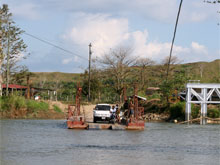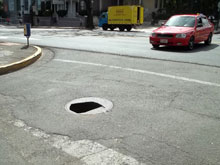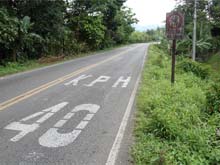Recommendations for driving in Costa Rica
Please take your time to inform yourself about the traffic conditions in Costa Rica. So you will be prepared for any kind of situation.
Road conditions of Costa Rica
The road conditions may differ a lot from what you are used from your country. Some of the roads are not paved in Costa Rica and potholes are common. A big limb on the road may indicate a pothole or another kind of obstacle on the road.
Verify if your vehicle is appropriate for the destination you are going to based on the road conditions, some roads require a four wheel drive. If there are rivers to cross be sure to drive a car with enough ground clearance. Only attempt to drive through a river if you know it's not too deep and maintain a steady, slow speed. Do not change gear because this can cause water to be sucked back through the exhaust.
Costa Rica is a mountainous country. Often it is necessary to drive through the mountains on small, curvy roads. That is why a journey often takes longer than it looked on the map. In addition there are other obstacles, like trucks, that slow down the traffic. Especially the loaded trucks that come from the ports of Limon or Caldera and head to San Jose often create long lines behind them. The curvy roads makes overtaking even more difficult.
Differences in the behavior of Costa Rican drivers
You should get used to the behavior of the drivers in Costa Rica. Many of them do not use turn signals and drive on the left side of the highway. Oncoming traffic that flashes the lights usually does so because of an obstacle or because of traffic police further ahead. There are many roadside police speed traps in Costa Rica. Buckling up is mandatory in Costa Rica.
Speed limits in Costa Rica
In residential areas the speed limit is 40 km/h. The maximum allowed speed on highways is usually 80 km/h. There are some highways where you are allowed to drive 90 or even 100 km/h. At sections where the highway passes villages the speed limit is 60 km/h. In areas of hospitals the speed limit is 25 km/h.
Traffic fines in Costa Rica
In case you get stopped by a traffic policeman you should never pay the fine in cash. Traffic fines are always paid at the bank in Costa Rica. Payments made directly to a police officer are always a bribe. If a policeman asks you for cash tell him that it is illegal. Bribing policemen only motivates them to continue with this practice. In case you are traveling with a rental car and get a ticket you should notify the car rental agency.
Behavior in case of a traffic accident
What should you do in case of an accident? In case of an accident you have to leave the vehicle at the place of the accident. Call the traffic police under 800-TRANSITO or call the bilingual emergency number 911. In addition you have to call the insurance company (INS). Their free number is 800-800-8000. Call the bilingual emergency number 911 in case people got hurt. Or call the cruz roja directly at 128. If you were driving a rental car it is important that you contact the car rental agency. Do not worry in case you travel without a mobile phone, almost all of the Costa Ricans have one. In an emergency situation someone will lend you his phone or make the calls for you.
Security advices
Do not leave the car in the street at night. Always use the parking lot of your hotel. Never leave any valuables unattended in the car.
Driving at night in Costa Rica
You should avoid to drive during night time in Costa Rica. It is much more difficult to read the signs in the dark. In case you arrive late in the evening or in the night in Costa Rica it is better to stay the first night in a hotel close to the airport. You can start driving early the next morning, relaxed, after a good night of sleep. At 6 pm it is dark in Costa Rica and at 5:30 am the sun goes up. There are not many road signs in Costa Rica. It is much easier to get lost during the night. Or you might hit a pothole, because you saw it too late. Take your time and enjoy your stay in Costa Rica.
By following our recommendations you can reduce many of the risks when driving a rental car in a foreign country.
Have a save trip!
National parks and integral nature reserves in Costa Rica on the map

Facts about National parks and integral nature reserves in Costa Rica
- The Irazu volcano national park was the first national park in Costa Rica.
- Poas volcano national park is the most visited national park in Costa Rica.
- The Manuel Antonio national park is the smallest national park in Costa Rica.







